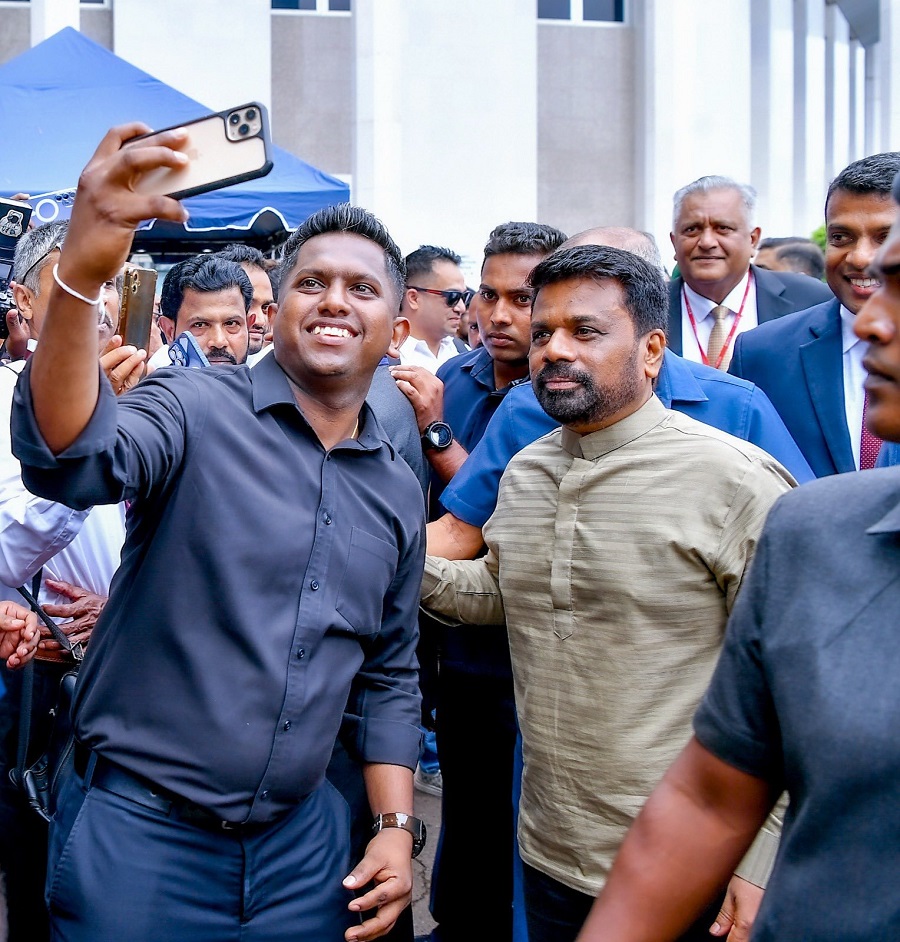-By LeN Political Correspondent

(Lanka-e-News -10.Aug.2025, 11.30 PM) Almost a year into the tenure of Sri Lanka’s first National People’s Power (NPP) administration, a discreet survey commissioned by a Western diplomatic mission has painted a strikingly positive picture of President Anura Kumara Dissanayake’s standing among the country’s most decisive voters — the 18 to 35 age group.
The confidential assessment, shared with a select group of foreign policy officials in Colombo and Western capitals, suggests that the president enjoys 72 per cent popularity among younger voters nationwide. The figure is not merely an electoral statistic: it signals that the president’s anti-corruption stance, minimalist governing style, and policies promoting ethnic harmony have cut through in a political culture long dominated by patronage and polarisation.
The diplomatic mission’s survey begins by acknowledging what many analysts have already concluded — that the 18–35 demographic was central to the NPP’s landslide victory. This cohort, weary of political dynasties, state-sponsored cronyism, and ethno-religious grandstanding, was instrumental in tipping the scales.
Interviews conducted across rural and urban districts found that young voters credit President Anura Kumara with:
Eliminating nepotism in government appointments. No ministers’ siblings, nephews, or sons have been handed plum posts, and no parliamentary backbencher has been gifted a “consultant” title with a taxpayer-funded salary.
Running the state on a lean budget. Respondents frequently contrasted the NPP’s approach with what they called “palace politics” of the past, where state resources were swallowed by luxury vehicles, overseas junkets, and vanity projects.
Delivering on anti-corruption promises. No minister in the NPP government has yet been implicated in a commission-for-contracts scandal — an unprecedented record in post-independence Sri Lanka.
Pursuing ethnic harmony. Under the current administration, there have been no major incidents of extremist Buddhist groups intimidating religious or ethnic minorities, a change noted with cautious optimism in multi-ethnic districts.
The survey results show that the president’s appeal is strongest outside Colombo. In rural districts, particularly in the North Central, Uva, and Eastern provinces, the NPP’s popularity hovers well above 75 per cent.
These areas, historically neglected by central governments obsessed with urban megaprojects, have benefited from smaller, targeted investments — rural electrification upgrades, microcredit schemes for farmers, and better-maintained provincial hospitals. Crucially, these initiatives have been implemented without the familiar pattern of inflated budgets and phantom contractors.
One farmer in Polonnaruwa told survey interviewers:
“We have seen governments come here and cut ribbons, take photographs, and disappear. This time, they came, they worked, and the money went to the project — not to their pockets.”
In Colombo and parts of the Western Province, the president’s approval is lower, though still above a pass mark. The survey records a 52 per cent popularity rating in the metropolitan area — notable, given the entrenched networks of the previous ruling class and the economic elite’s lingering scepticism about the NPP’s socialist roots.
Critics in these circles tend to frame the government as “overly idealistic” and lacking in corporate engagement. Some lobbyists interviewed by the diplomatic mission argued that “foreign investment will not thrive in a climate where political connections are no longer rewarded.”
In essence, what the president’s rural supporters hail as integrity, his urban critics sometimes dismiss as naïveté.
Perhaps the most telling insight from the survey is not about policy at all — but about communication. Younger voters consistently cited the president’s direct, unembellished manner as a reason for their trust. Public speeches, livestreamed Q&A sessions, and town hall meetings have given the impression of accessibility and accountability.
Policy-wise, the president’s economic approach — balancing fiscal discipline with targeted social spending — has resonated. Job creation schemes aimed at vocational training rather than bloated public sector hiring have been welcomed, particularly among educated but underemployed youth.
One university graduate in Jaffna remarked:
“For the first time, I feel the government is trying to prepare us for jobs that actually exist — not jobs invented to pay political debts.”
The survey notes that President Anura Kumara has approached ethnic reconciliation without the grand declarations that characterised past governments. Instead, his administration has focused on administrative fairness: equal access to state services, appointments in mixed communities that reflect diversity, and an explicit policy of non-interference with minority religious practices.
Observers in the diplomatic community see this as a deliberate attempt to remove ethnicity as a political bargaining chip — a shift that has not gone unnoticed by voters weary of communal divisions.
Diplomats were particularly interested in the operational costs of the presidency. According to the survey’s financial review, the president’s office has reduced discretionary spending by nearly 40 per cent compared to his predecessor’s first year. Gone are the convoys of luxury SUVs; official trips abroad are leaner, often with delegations of under ten people; and domestic travel is more modest, sometimes using regular state transport facilities.
This frugality is both a symbolic and practical break from tradition, and it resonates strongly with younger voters, many of whom have grown up in an era of economic crisis.
The confidential report concludes that the president’s high standing among young voters “provides a durable foundation for continued political stability” — provided the government can maintain economic growth and avoid the scandals that have plagued every administration since the 1970s.
The authors caution, however, that popularity can be volatile in a social media–driven age. A single high-profile misstep, particularly in areas of transparency or governance, could erode the NPP’s clean image.
One comment in the report, attributed to a Colombo-based political commentator, may encapsulate why the president’s approval ratings remain strong:
“He has delivered more of his promises with less money than anyone before him. In a country used to leaders who promise the world and leave us the bill, that’s a revolution in itself.”
-By LeN Political Correspondent
---------------------------
by (2025-08-10 19:05:18)
Leave a Reply